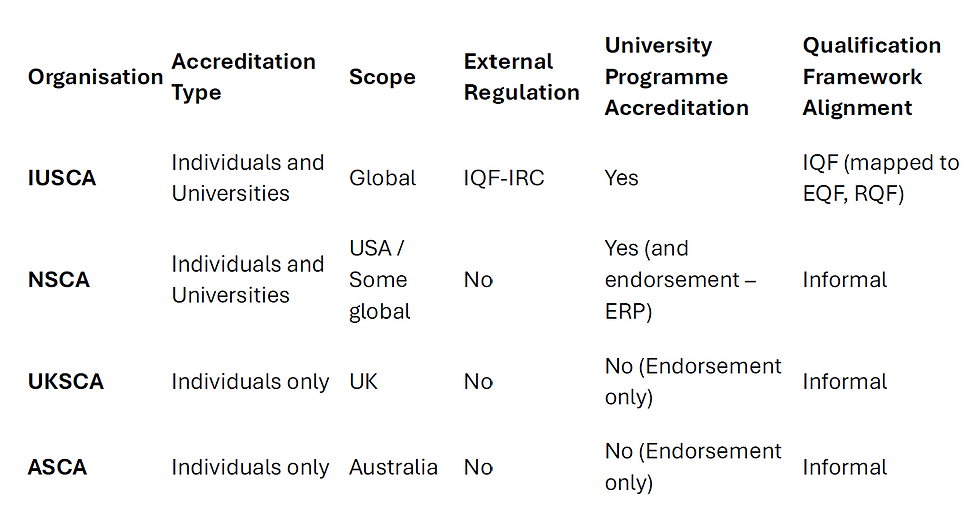Major Governing Bodies in Strength and Conditioning
- Feb 1, 2024
- 4 min read
Updated: Jul 15
As the strength and conditioning (S&C) profession continues to evolve, so too does the importance of high-quality certification and accreditation. With increasing demand for professional standards, recognition, and international mobility, understanding the role of major governing bodies has become essential for both practitioners and institutions.
This article provides an overview of the primary organisations involved in accrediting strength and conditioning education and certification globally, and explains the differences in scope, approach, and legitimacy between them.
What is Accreditation, and Why Does it Matter?
Accreditation refers to the formal, structured evaluation of a certification or programme against recognised standards. It involves scrutiny of curriculum content, delivery quality, assessment rigour, and ongoing quality assurance. Unlike simple certification, which may be issued upon course completion or a single assessment, accreditation reflects sustained compliance with defined educational and professional benchmarks.
Accredited certifications offer a higher standard of validity, portability, and professional recognition than non-accredited alternatives. They are often prerequisites for insurance coverage, employer recognition, and progression to higher-level qualifications.
1. IUSCA (International Universities Strength and Conditioning Association)
Scope: Global
Accreditation Type: Dual – Individuals and Universities
Regulation: Independent via IQF-IRC
Approach: Scientific, university-led, anti-dogmatic
The IUSCA is the only global accreditation body for strength and conditioning, offering a unique dual structure that certifies both individual practitioners and entire university programmes. Its approach is grounded in academic and scientific integrity, with accreditation standards co-developed in collaboration with over 150 institutions and professional organisations worldwide.
Crucially, the IUSCA operates within the International Qualification Framework (IQF) and is regulated by the IQF-Independent Regulatory Council (IQF-IRC). This added layer of independent oversight ensures that its certifications are benchmarked against international standards, free from commercial or ideological bias.
The IUSCA has published peer-reviewed research outlining its practitioner development model and the development of the IQF:
The IUSCA's foundational principles are based on transparency, anti-dogmatism, and the advancement of scientific evidence. This stands in contrast to many industry-led bodies, whose standards may reflect ideological adherence to specific training methodologies.
2. NSCA (National Strength and Conditioning Association)
Scope: Primarily USA, some international influence
Accreditation Type: Dual – Individuals and Academic Programmes
Regulation: Self-regulated
Approach: Industry-based, certification-focused
The NSCA is one of the most widely known professional organisations in S&C. Its flagship certification, the Certified Strength and Conditioning Specialist (CSCS), is commonly used as a benchmark for employment in North America. In addition to certifying individuals, the NSCA also accredits university programmes through its ERP (Education Recognition Program).
However, unlike IUSCA accreditation, the NSCA ERP is not independently regulated and is not mapped to an international qualification framework. Standards are developed and enforced internally by the organisation, which may limit cross-border recognition.
While the NSCA has made efforts to expand globally, its primary influence remains in North America, and its accreditation structure is largely national in design.
3. UKSCA (UK Strength and Conditioning Association)
Scope: United Kingdom
Accreditation Type: Individuals only
Regulation: Self-regulated
Approach: Industry-based, high-stakes certification
The UKSCA operates within the UK and offers a single, high-level professional certification: the Accredited Strength and Conditioning Coach (ASCC). This certification is awarded through a rigorous assessment process that includes case studies, interviews, and practical evaluations. The defining factor of the UKSCA Accreditation is its highly technical weightlifting practical assessment. While this demonstrates that successful individuals can attain certain high-level competencies, it is questionable whether this is the best way to assess an S&C coach/practitioner, or indeed, whether Olympic weightlifting is a priority in S&C practice.
However, the UKSCA does not accredit academic programmes or universities, and there is no external regulation of its certification pathway. While the ASCC is recognised in the UK employment landscape, its portability outside the UK is limited, and its alignment with qualification frameworks such as the RQF or EQF remains informal.
The UKSCA is structured as an industry body, and its certification reflects its internal ideology and assessment models, rather than adherence to broader scientific or educational standards.
4. ASCA (Australian Strength and Conditioning Association)
Scope: Australia
Accreditation Type: Individuals only
Regulation: Self-regulated
Approach: Tiered certification model, CPD-focused
The ASCA provides a tiered certification system for S&C coaches in Australia, ranging from Level 1 to Level 3 Elite. Certification is awarded based on educational attainment, coaching experience, and CPD hours. Like the UKSCA, the ASCA does not accredit universities or degree programmes, nor does it operate within an external regulatory framework.
While widely respected within Australia, ASCA certification is not formally aligned with international qualification frameworks, and recognition outside the region can be inconsistent.
Organisation Summary

Conclusion
The global S&C profession requires a coherent, credible, and standardised approach to certification and accreditation. While the NSCA, UKSCA, and ASCA have contributed significantly to the development of the field, they are primarily regional, self-regulated, and ideologically driven organisations.
The IUSCA stands apart in its scientific, transparent, and globally collaborative approach, offering dual accreditation for both individuals and institutions, and ensuring full alignment with the IQF under the independent oversight of the IQF-IRC.
As the profession matures, the future lies not in proprietary systems or isolated standards, but in internationally recognised, independently regulated, and scientifically grounded pathways. The IUSCA represents that future.



